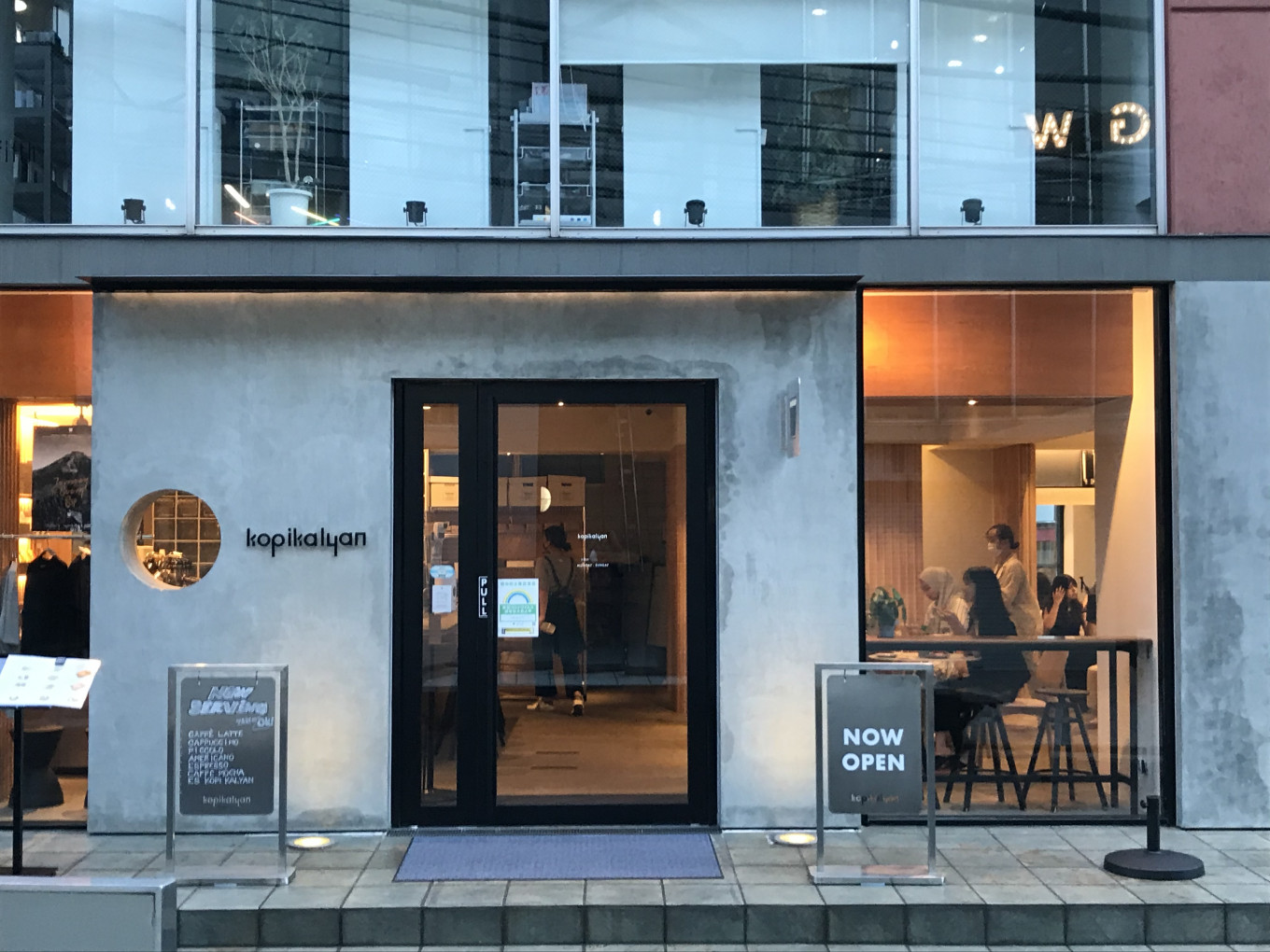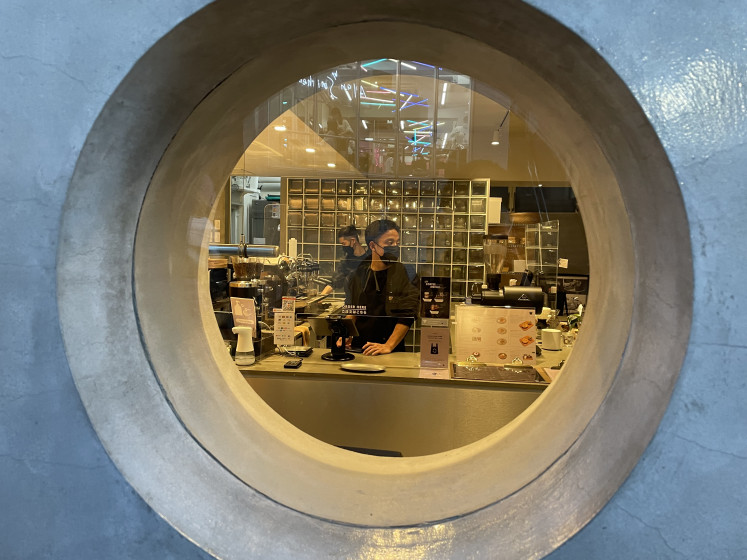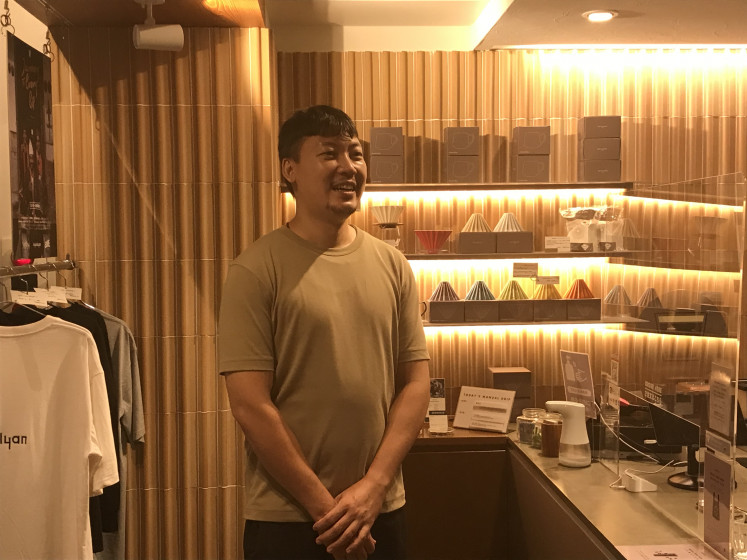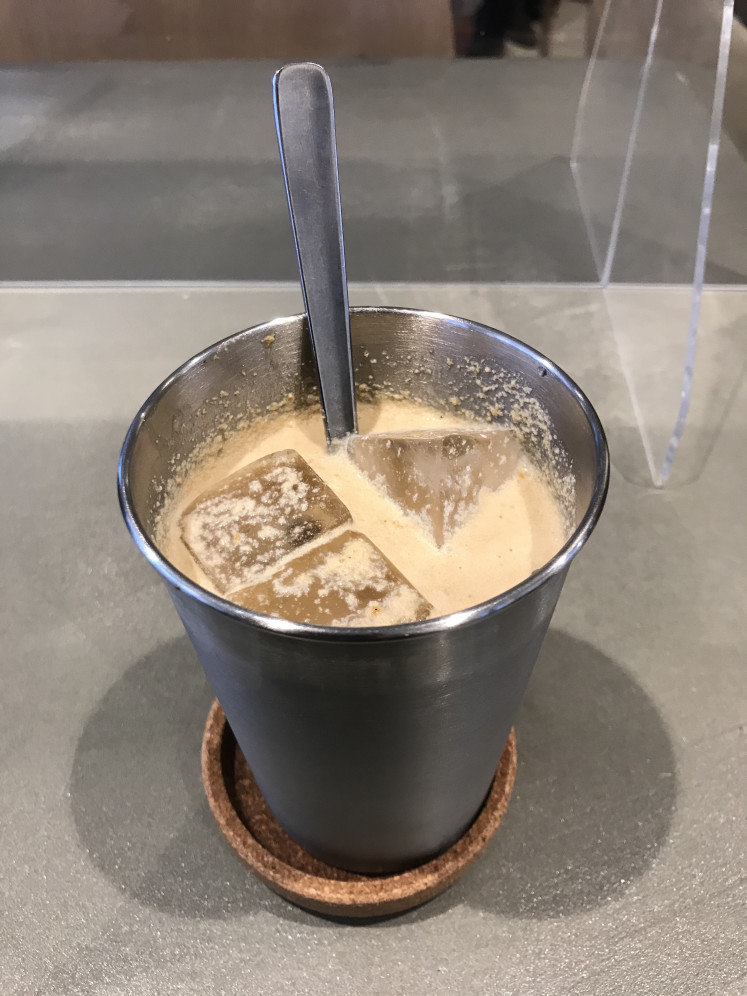Popular Reads
Top Results
Can't find what you're looking for?
View all search resultsPopular Reads
Top Results
Can't find what you're looking for?
View all search resultsIndonesian cafe serves up local coffee to Tokyo's centre of hipness
An Indonesian coffee chain tries its luck in Tokyo's center of hip culture and new trends.
Change text size
Gift Premium Articles
to Anyone
An Indonesian coffee chain tries its luck in Tokyo's center of hip culture and new trends.
The Harajuku district, located in the heart of Tokyo’s Shibuya, is one of the world’s most renowned youth culture centers. Always filled with the hippest looking people and stores, the area has bred various trends, from fashion to hip urban activities. It is also where the first cafe chain from Indonesia, away from the ever-intensifying competition at home, launched its first outlet.
Hip spot: Kopikalyan's location in Harajuku puts it in the middle of one of Japan's trendiest areas. (JP/Takehiro Masutomo) (JP/Takehiro Masutomo)In December 2020, Kopikalyan, which runs three coffee shops under the same name in Indonesia, opened its first Japanese outlet there.
“Our goal is to introduce Indonesian coffee culture to the people of Japan”, Kenny Erawan Tjahyadi, who manages the chain’s Japan operation, said.
Its signature Iced Kopikalyan ice coffee, priced 650 yen (US$5.67) for a single shot, uses organic arena palm sugar to create its soft and sweet texture.
Kenny, who comes from a family of Balinese coffee business entrepreneurs, said he wanted to support Indonesia’s small-scale bean farmers by introducing to Japan their particular coffee beans.
For some time, the cafe had only offered coffee beans from Java, but this summer it began selling six types of beans from other regions including Sulawesi, Flores and Sumatra.
Coffee Boss: Kenny Erawan Tjahyadi manages Kopikalyan's Japan operation. (JP/Takehiro Masutomo) (JP/Takehiro Masutomo)A selling point of the cafe is its relaxing atmosphere. The interior design, according to Kenny, has a historical feel similar to that of the shops in Jakarta. That is probably why Kopikalyan has attracted not only Indonesians living in Japan but also Japanese patrons.
“This is our first time here”, one pair of Japanese women in their 30s who chose to remain anonymous shared. They chose this Indonesian cafe because it “looked nice” on Google Maps. The hot coffee they ordered was, one of them said, “creamy and easy to drink”.
The other woman tried the cafe’s serving of tempe, which was recently added to the cafe’s lineup. “I heard it was made from fermented soybeans, so I imagined it was like natto,” she said, referring to the fermented soybean food from Japan known for its powerful smell and sticky texture. “It’s so different”, she said, her eyes widening with intrigue.
Turning Japanese
Indonesia has always been a global coffee powerhouse. According to 2020 statistics, Indonesia is the fourth largest coffee producer after Brazil, Colombia and Vietnam.
The number of coffee shops, both big and small, has skyrocketed in the past few years as competition among local cafe chains intensified.
Japanese daily Nikkei in a 2019 article mentioned Kopi Kenangan and Fore as some of the country’s fastest-growing affordable coffee chains targeting middle-class Indonesians. Just as Luckin Coffee grew rapidly in China after raising funds, investment money is flowing into coffee shop chains in Indonesia, resulting in Kopi Kenangan reaching unicorn status very recently.
Kenny said that in the past few years, many younger Indonesians who had studied abroad, came back as baristas and thought “there [were] no cafes, so let's start one”.
For everyone: Kopikalyan has attracted not only Indonesians living in Japan but also Japanese patrons. (JP/Takehiro Masutomo) (JP/Takehiro Masutomo)Kopikalyan's entry into Japan is also noteworthy in terms of the fusion of Japanese and Indonesian cafe culture as Kenny said people who open street cafes in Indonesia often use Japanese coffee shops as a reference. For instance, Indonesian cafes sometimes use Japanese katakana words in their social media posts as if they originated in Japan.
“The Indonesian eating-out industry is very Japanized”.
Minami Furuhashi, the winner of Japan Cup Tasters Championship 2021 believes Indonesian cafe chains have a chance of success in Japan, a market saturated with local cafes and American chains. “The direct connection to [coffee bean] producers is a strength. I'm certain they also have a different sense of attachment”.
She said that Indonesian coffee, which has leathery and earthy flavors, has always been popular among Japanese coffee enthusiasts. Coffee Factory, a cafe chain in Tsukuba City where she works as a barista, has also sold Mandheling Lintong beans since 2016. She expects the quality and price of Indonesian coffee to go up further as Indonesia has become the first Asian country to host the Cup of Excellence, a globally renowned coffee competition.
The coffee shop chain’s ambition is echoed by Katsunari Iwashita, who runs his business only selling Indonesian coffee beans in Kumamoto, southwestern Japan.
Iwashita, the owner of Iwashita Coffee, said that although the Sumatra Mandheling beans is known to some extent among Japanese coffee lovers, it still lags behind Latin American coffees such as Blue Mountain, in terms of name recognition. This is where he saw an opening.
In 2011, the then-expat visited a village in Toraja, South Sulawesi, and fell in love with Indonesian coffee in a sip. “I was surprised by its refreshing acidity”. He was convinced traceable coffee beans imported directly from Indonesia would sell well in Japan.
Apart from actual cafes and coffee bean stores, the appeal of Indonesian coffee may also gradually penetrate Japan through literature. Filosofi Kopi, a collection of short stories including one following two friends’ struggle to open their dream cafe, written by Indonesian novelist Dee Lestari, was translated into Japanese in 2019.
Kenny is confident that his cafe chain can succeed in the Japanese market. “Even now, many Japanese enthusiasts are trying to import beans from minor farmers [in Indonesia]. I think Indonesian coffee is booming here”.














